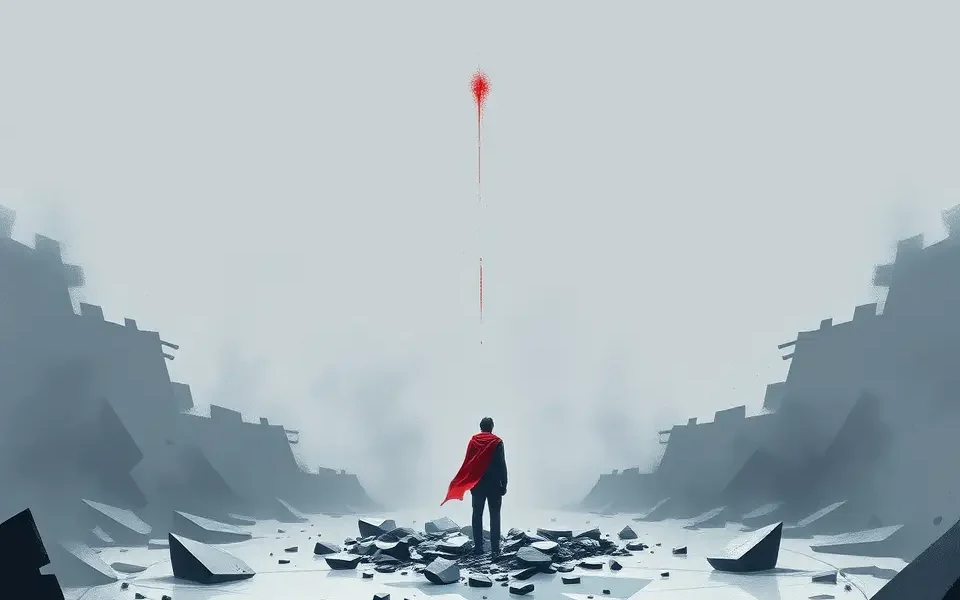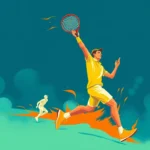Iga Swiatek, the world No. 2, experienced a stunning defeat at the Madrid Open 2025, falling to Coco Gauff in a semifinal that saw her win only two games. In the aftermath, Swiatek frankly admitted she “didn’t even have a plan B” during the match, a rare admission from a player known for her strategic prowess and mental fortitude. This candid revelation shines a light on the challenges even the most dominant athletes face when their primary strategies crumble.
The Gauff Onslaught: A Match to Forget
The Madrid Open semifinal was far from the typical Swiatek performance. Gauff overpowered her, securing a 6-1, 6-1 victory. This marked Gauff’s first clay victory against Swiatek, ending the Pole’s dominant run in Madrid and raising questions about her form heading into the rest of the clay season.
Swiatek, usually a force to be reckoned with on clay, struggled with her movement and was unable to execute her game plan. According to Swiatek, she experienced stiffness in her legs and an inability to properly position herself for her shots, which had a cascading effect on her entire game. “I feel that I couldn’t move well,” Swiatek explained. “Today, I couldn’t even put a Plan B into play. Nothing worked for me today. Everything collapsed.”
A Season of Struggles?
This loss continues a troubling trend for Swiatek, who, despite reaching at least the quarter-finals in every tournament in 2025, has not reached a final since winning the French Open last June. This is a significant drought for a player of her caliber. It also means that Swiatek has failed to reach the final at any tournament she’s played thus far this year.
While Swiatek has shown tenacity in overcoming difficult situations in previous matches, like her comeback from a set and a break down against Alexandra Eala, the Gauff match revealed a concerning inability to adapt when her initial strategies failed. This inflexibility is unusual for Swiatek, who is known for her tactical intelligence and ability to adjust her game during a match.
Decoding “No Plan B”: What It Really Means
Swiatek’s statement that she “didn’t even have a plan B” speaks volumes about the nature of her struggles during the match. It suggests a few possibilities:
- Over-Reliance on a Primary Strategy: Swiatek might have entered the match with a specific game plan tailored to exploit perceived weaknesses in Gauff’s game. When Gauff neutralized this strategy or when Swiatek was unable to properly execute it, she lacked a viable alternative.
- Mental Block: The pressure of defending her title and the high expectations surrounding her may have created a mental block, preventing her from thinking clearly and creatively when things started to go wrong.
- Physical Limitations: The stiffness in her legs and the mobility issues she mentioned could have limited her options, making it difficult to implement alternative strategies that required greater agility and court coverage.
- Loss of Confidence: The early setbacks in the match may have eroded her confidence, making her hesitant to try new things or take risks.
The Importance of Adaptability in Tennis
Tennis is a dynamic sport where conditions, opponents, and even one’s own physical and mental state can change rapidly. A rigid, inflexible approach is rarely successful. Top players need to be able to:
- Recognize When a Strategy Isn’t Working: This requires acute self-awareness and the ability to objectively assess the situation.
- Identify Alternative Strategies: This demands a broad understanding of the game and the ability to see different tactical options.
- Execute Those Strategies Effectively: This requires technical skill, physical ability, and the confidence to try something new under pressure.
Lessons from the Loss: How to Develop a “Plan B” Mindset
Swiatek’s defeat offers valuable lessons for tennis players of all levels. Here’s how to cultivate a “Plan B” mindset and become more adaptable on the court:
- Diversify Your Game: Don’t become overly reliant on one or two strengths. Develop a well-rounded game with a variety of shots, tactics, and playing styles.
- Study Your Opponents: Thoroughly analyze your opponents’ strengths and weaknesses. Identify potential vulnerabilities you can exploit and develop strategies to counter their strengths.
- Practice Different Scenarios: During practice, simulate different match situations and experiment with different strategies. This will help you develop a broader range of options and build confidence in your ability to adapt.
- Develop Mental Flexibility: Learn to recognize when your initial strategy isn’t working and be willing to abandon it in favor of something else. Practice staying calm and focused under pressure, and cultivate a positive attitude that allows you to see opportunities even in difficult situations.
- Trust Your Instincts: Sometimes, the best “Plan B” is simply to trust your instincts and go for a shot or tactic that feels right in the moment.
- Learn from Every Match: After every match, take time to analyze what worked and what didn’t. Identify areas where you could have been more adaptable and use those insights to improve your game.
- Focus on the Process, Not Just the Outcome: Shift your focus from the results to the process of enjoyment. Accept the journey of growth and trust your ability to improve with each practice session and match.
Mental Training: A Key Component
Mental training techniques can significantly improve focus, resilience, and emotional control. Practicing visualization, mindfulness, and relaxation techniques can sharpen mental skills. This can be a stepping stone to a winner’s mindset.
The Road Ahead: Rome and Roland Garros
Following her Madrid defeat, Swiatek plans to take a few days off before returning to the court in Rome, where she is also the defending champion. She will need to address the issues that plagued her in Madrid if she hopes to regain her form and defend her title at the French Open.
The tennis world will be watching closely to see how Swiatek responds to this setback. Will she be able to learn from her mistakes and develop a more adaptable game? Or will she continue to struggle when her primary strategies fail? Only time will tell. However, one thing is certain: Iga Swiatek’s journey is far from over, and her ability to overcome challenges will define her legacy as a champion.
Casper Ruud’s Encouragement
Following the loss, ATP star Casper Ruud offered words of encouragement to Swiatek, acknowledging her inspiring presence and predicting a stronger comeback. This display of support highlights the camaraderie within the tennis community, even amidst fierce competition.
Coco Gauff’s Perspective
Coco Gauff, on the other hand, expressed pride in her aggressive mentality and execution during the match. She acknowledged that Swiatek might not have been at her best but credited herself for forcing Swiatek into uncomfortable positions. Gauff’s victory marked a significant milestone in her career, securing her a spot in the Madrid Open final and solidifying her status as a top contender for the French Open.
Gauff’s Victory and its impact
Gauff’s victory over Swiatek is her first over the four-time Roland-Garros champion in six attempts on clay, sealing a first WTA 1000 singles final on this surface with a shot at a 10th career singles title this weekend. She saved her most dominant performance for the Caja Magica, where she had never been past the fourth round in four previous appearances. After dropping a 6-0 first set to Dayana Yastremska in her opening match, Gauff adjusted to the high-altitude conditions with aplomb, scoring back-to-back victories over Belinda Bencic and No. 7 seed Mirra Andreeva to book a rematch with Swiatek.
Final Thoughts
Iga Swiatek’s Madrid Open loss was a wake-up call. It underscored the importance of adaptability, mental resilience, and a well-rounded game in professional tennis. While the defeat was undoubtedly disappointing, it also presents an opportunity for Swiatek to learn, grow, and come back even stronger. Her response in the upcoming tournaments will be a testament to her character and determination.








No Comment! Be the first one.